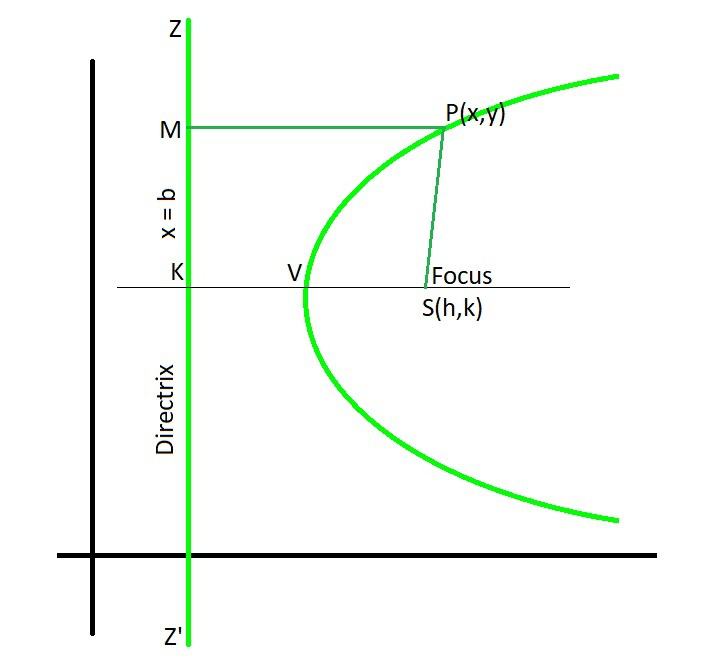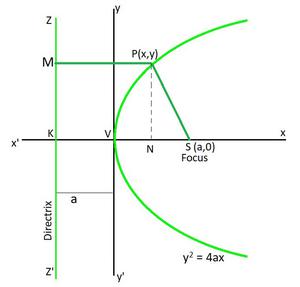How To Find The Dilation Of A Parabola
In mathematics, a parabola is the locus of a point that moves in a plane where its distance from a fixed point known as the focus is always equal to the distance from a fixed straight line known as directrix in the aforementioned airplane. Or in other words, a parabola is a aeroplane bend that is almost in U shape where every point is equidistance from a stock-still point known as focus and the straight line known every bit directrix. Parabola has only one focus and the focus never lies on the directrix. Equally shown in the beneath diagram, where P1M = PiSouthward, P2M = PtwoDue south, P3M = PthreeDue south, and P4M = PfourS.

Equation of the parabola from focus & directrix
Now we will learn how to find the equation of the parabola from focus & directrix. So, let S be the focus, and the line ZZ' be the directrix. Describe SK perpendicular from Southward on the directrix and bisect SK at Five. And so,
VS = VK
The altitude of V from the focus = Distance of V from the directrix
V lies on the parabola, And then, SK = 2a.
Then, VS = VK = a

Let's take 5 as vertex, VK is a line perpendicular to ZZ' and parallel to the x-centrality. Then, the coordinates of focus S are (h, k) and the equation of the directrix ZZ' is x = b. PM is perpendicular to directrix x = b and point Thou will be (b, y)
Let usa considered a point P(ten, y) on the parabola. Now, bring together SP and PM.
Every bit we know that P lies on the parabola
So, SP = PM (Parabola definition)
SP2 = PM2
(x – h)2 + (y – yard)2 = (x – b)2 + (y – y)2
x2 – 2hx + h2 + (y-thou)2 = x2 – 2bx + b2
Add (2hx – b2) both side, nosotros get
102 – 2hx + h2 + 2hx – b2 + (y-k)2 = tentwo – 2bx + b2 + 2hx – b2
2(h – b)ten = (y-k)two + h2 – btwo
Split equation past ii(h – b), we go
x =![]()
x =
………………..(i)
Similarly when directrix y = b, nosotros get
y =
………………..(2)
When V is origin, VS every bit ten-axis of length a. Then, the coordinates of S will be (a, 0), and directrix ZZ' is x = -a.
h = a, k = 0 and b = -a
Using the equation (1), we get
ten =![]()
ten =![]()
y2 = 4ax
Information technology is the standard equation of the parabola.
Note: The parabola has ii real foci situated on its axis one of which is the focus Due south and the other lies at infinity. The respective directrix is also at infinity.
Tracing of the parabola ytwo = 4ax, a>0
The given equation can exist written every bit y = ± 2![]() , nosotros find the following points from the equation:
, nosotros find the following points from the equation:
- Symmetry: The given equation states that for every positive value of x, at that place are 2 equal and opposite value of y.
- Region: The given equation states that for every negative value of x, the value of y is imaginary which means no part of the curve lies to left of the y-axis.
- Origin: Origin is the point from where the curve passes through and the tangent at the origin is x = 0 i.east., y-centrality.
- Portion occupied: Every bit x⇢∞, y⇢∞. Hence the curve extends to infinity to the right of the axis of y.
Some other standard forms of the parabola with focus and directrix
The simplest class of the parabola equation is when the vertex is at the origin and the centrality of symmetry is forth with the x-axis or y-axis. Such types of parabola are:
1. y2 = 4ax

Here,
- Coordinates of vertex: (0, 0)
- Coordinates of focus: (a, 0)
- Equation of the directrix: x = -a
- Equation of axis: y = 0
- Length of the latus rectum: 4a
- Focal distance of a indicate P(ten, y): a + x
two. x2 = 4ay

Hither,
- Coordinates of vertex: (0, 0)
- Coordinates of focus: (-a, 0)
- Equation of the directrix: 10 = a
- Equation of centrality: y = 0
- Length of the latus rectum: 4a
- Focal altitude of a indicate P(x, y): a – x
iii. y2 = – 4ay

Here,
- Coordinates of vertex: (0, 0)
- Coordinates of focus: (0, a)
- Equation of the directrix: y = -a
- Equation of axis: x = 0
- Length of the latus rectum: 4a
- Focal altitude of a point P(x, y): a + y
iv. x2 = – 4ay

Hither,
- Coordinates of vertex: (0, 0)
- Coordinates of focus: (0, -a)
- Equation of the directrix: y = a
- Equation of axis: ten = 0
- Length of the latus rectum: 4a
- Focal distance of a indicate P(10, y): a – y
Sample Issues
Question i. Find the equation of the parabola whose focus is (-4, 2) and the directrix is 10 + y = 3.
Solution:
Let P (10, y) exist any point on the parabola whose focus is (-four, 2) and the directrix x + y – 3 = 0.
As nosotros already know that the distance of a point P from focus = distance of a point P from directrix
So, √(x + 4)2 + (y – two)2 =

On squaring both side we get
(ten + iv)ii + (y – 2)2 =

2((ten2 + sixteen + 8x) + (y2+ 4 – 4y)) = 10two + y2 + nine +2xy – 6x – 6y
2(ten2 + 20 + 8x + y2 – 4y) = xtwo + y2 + ix +2xy – 6x – 6y
2x2 + 40 + 16x + 2ytwo – 8y = xii + y2 + ix +2xy – 6x – 6y
xtwo + y2 + 2xy + 10x – 2y + 31 = 0
Question 2. Discover the equation of the parabola whose focus is (-four, 0) and the directrix x + half dozen = 0.
Solution:
Let P (ten, y) exist any point on the parabola whose focus is (-4, 0) and the directrix x + 6 = 0.
Equally we already know that the distance of a point P from focus = distance of a point P from directrix
So, √(x + 4)2 + (y )2 =

On squaring both side we become
(x + iv)2 + (y)2 =

2x2 + 32 + 16x + 2y2 = x2 + 36 + 12x
x2 + 2ytwo – 4 + 14x = 0
Question 3. Find the equation of the parabola with focus (iv, 0) and directrix 10 = – 3.
Solution:
Since the focus (4, 0) lies on the x-axis, the x-axis itself is the axis of the parabola.
Hence, the equation of the parabola is of the class either
y2 = 4ax or y2= – 4ax.
Since the directrix is x = – three and the focus is (four, 0),
the parabola is to be of the grade ytwo= 4ax with a = iv.
Hence, the required equation is
yii = four(four)x
yii = 16x
Question four. Observe the equation of the parabola with vertex at (0, 0) and focus at (0, 4).
Solution:
Since the vertex is at (0, 0) and the focus is at (0, 5) which lies on y-centrality, the y-axis is the axis of the parabola.
Hence, the equation of the parabola is x2= 4ay.
Hence, we have 10two = four(4)y, i.e.,
xii = 16y
Focus & directrix of a parabola from the equation
At present we will learn how to find the focus & directrix of a parabola from the equation.

And then, when the equation of a parabola is
y – k = a(x – h)two
Here, the value of a = 1/4C
And so the focus is (h, k + C), the vertex is (h, k) and the directrix is y = yard – C.
Sample Examples
Question i. y2 = 8x
Solution:
The given parabola is of the form y2 = 4ax, where
4a = 8
a = ii
The coordinates of the focus are (a,0), i.east. (ii,0)
and, the equation of the directrix is
x = -a, i.e. x = -2
Question 2. ytwo – 8y – x + xix = 0
Solution:
By rearranging, we get
yii – 8y + 16 – x + three = 0
yii – 8y + 16 = x – 3
x = (y-4)ii + iii
Comparing with eq(1), we conclude
chiliad = 4
2(h-b) = 1 ……………(I)
= 3 ……………(II)
Solving (I) and (II), we get
h =
and b =

Hence, Focus is (h,k) = (
,four)
and, directrix x = b =

Question 3. Find focus, directrix and vertex of the following equation: y = x2 – 2x + 3
Solution:
By rearranging, nosotros become
y =102 – 2x + 4 – 1
y =(x-one)two + 2
Comparing with eq(4), we conclude
h = 1
y1 = 2
2(g-b) = i ……………(I)
= ii ……………(II)
Solving (I) and (Ii), we get
k =

and b =

Hence, Focus is (h,m) = ( 1,
),
directrix y = b =

and, vertex (h, y1) = (1,2)
Source: https://www.geeksforgeeks.org/focus-and-directrix-of-a-parabola/
Posted by: vargashattacte.blogspot.com


0 Response to "How To Find The Dilation Of A Parabola"
Post a Comment